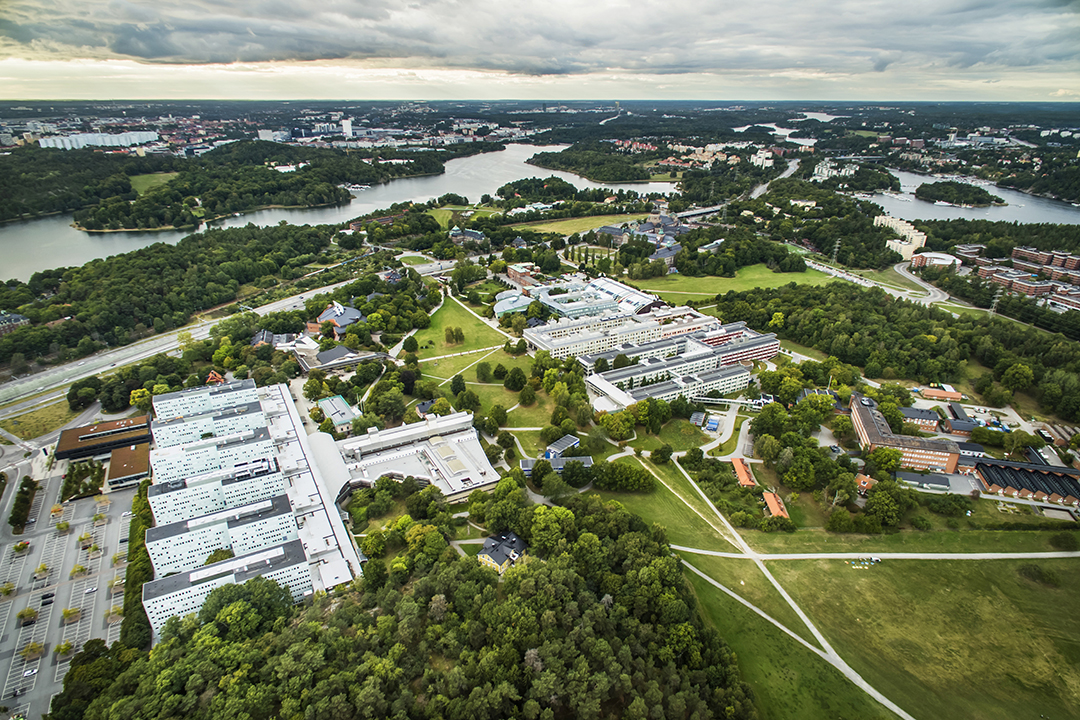Swedish News:
Smallest population increase in 15 years / Swedish universities rank high / Distance learning may return / Construction, sports and leisure winners during the pandemic / Record number of 'vab' days.
-
 "Frescati" - Stockholm University campus area, part of the Royal National City Park. Photo: Niklas Björling
"Frescati" - Stockholm University campus area, part of the Royal National City Park. Photo: Niklas Björling -
-
Smallest population increase in 15 years
The Swedish population is today 10.3 million. Halfway through 2020, the country's population had increased by 24,801 people, compared with last year’s 51,004 people, according to Statistics Sweden (SCB). This is the lowest population increase for the first six months of the year since 2005; unlike previous years, more people are now moving from rather than to Stockholm and Gothenburg. -
 The King waves to the Swedish people as he celebrates 40 years as King in 2013. Photo Alexis Daflos/Kungahuset.se
The King waves to the Swedish people as he celebrates 40 years as King in 2013. Photo Alexis Daflos/Kungahuset.se -
-
Swedish universities rank high
Three Swedish universities qualify in a recent ranking of the world's top 100 universities. Karolinska Institutet is highest among the Swedish institutions, ranking 45th on the Academic Ranking of World Universities (ARWU)—that's a drop of seven places since last year. Stockholm University is ranked 69th in this year's list, an improvement over last year's 73rd place. Uppsala University lands in 77th place compared to being in 62nd place last year. The American universities Harvard and Stanford are first and second on the list respectively. -
Distance learning may return
Swedish schools will adapt their teaching in several ways this fall, announces Anna Ekström, Minister for Upper Secondary School and Adult Education and Training. Some measures at the start of the school year include more space between desks and fewer large gatherings, which mean students do not start and end at the same time. Ekström says there are great risks associated with closing schools, but at the same time announces that depending on the situation of the pandemic distance learning may again become relevant. -
Lövin is leaving politics
The Green Party's Isabella Lövin will leave her position as spokesperson and her ministerial post when a replacement is appointed. "The best thing for the party is to be able to choose a new female spokesperson who will enter the election campaign with full force in 2022," she told Swedish media, adding, "I have been in politics for 12 years, it has been demanding. You give everything in this position.” Lövin, spokesperson since 2016, says the decision is not due to the disagreement that exists between the Green Party (MP) and the Social Democrats on some issues. -
Stefan Löfven: "Sad and unexpected"
Prime Minister Stefan Löfven says in a statement that Isabella Lövin's decision is "sad and unexpected," but that she has done a lot for her party and Sweden. Center Party Leader Annie Lööf writes on Twitter that Lövin "with great commitment" pushed issues on the environment. Former Foreign Minister Margot Wallström also praises Lövin on Twitter: "You have worked tirelessly on climate issues and are appreciated for it all over the world." -
Construction, sports and leisure winners
Many industries have had a tough time during the corona pandemic. But there are also those who have seen increased sales when Swedes stayed at home more than usual. Among the main winners are construction, sports, leisure and home furnishings, according to Statistics Sweden. During the second quarter, the hardware and construction trade increased their sales by almost 20%, compared with the same period last year. Sporting goods increased by 11.1% and home furnishings by 10.4%. Sales of clothing, footwear and jewelry fell sharply. -
Budget item: the unemployed
LO, the Swedish Trade Union Association, demands investments for the unemployed and sick in the government budget for 2021, which will be released September 21. The union wants, for example, that the temporary increases in the unemployment insurance during the corona crisis remain. However, no promises about such investments have come from Minister of Finance Magdalena Andersson. The government's supporting parties are also opposed to making the unemployment insurance fund and health insurance more generous. -
Three summers of train trouble are over
One of the country's worst bottlenecks for trains has been refurbished. The new so-called “getingmidjan” (the wasp waist) was recently introduced in central Stockholm. The section between Stockholm Central Station and Stockholm South, which is described by the Swedish Transport Administration as "Sweden's busiest," has been closed for eight weeks of intensive work for three summers in a row. Now the trains are rolling again. -
Students need more time
In just a couple years, students who almost pass a class will be able to get the new grade Fx. And in a few more years, the upper secondary schools' course grades may be gone altogether, according to an investigation proposal. "Today's grading system is perceived by many as punitive, says Minister of Education Anna Ekström and adds that it is important for students to have more time to develop before a decisive grade is set. The central point of the proposal is that course grades are replaced with subject grades that provide an overall assessment of subject knowledge. -
Record number of vab days
The number of “vab” days (Vård Av Barn - care of children) this spring broke all records, according to statistics from the Swedish Social Insurance Agency. In April, 1,341,376 days were taken, which is almost twice as many as in April last year. Niklas Löfgren at the Swedish Social Insurance Agency does not believe children were sicker than usual but that parents followed the recommendation to stay home "at the slightest symptom." He says, "I think they were more careful and chose to keep the children at home." In Sweden a parent can receive compensation for up to 120 days per year from the time the child is 8 months old until the child turns 12 years old. This special sick leave cost the treasury SEK 1.3 billion in April alone. -
Older people with COVID-19
A large majority of the elderly who died outside the hospital with confirmed cases of COVID-19 also had other diseases that contributed to or were absolutely decisive for the patient's death, according to a review from the Region Östergötland. The report shows that in 15% of the investigated cases, the coronavirus was judged to have been the direct cause, but in 85% the virus was only a contributing cause or did not affect at all, according to Läkartidningen (the Swedish Medical Journal). The most common contributing causes of death were heart disease, lung disease or dementia. -
Swedes are using plastic again
Debit card transactions continued to increase during the second week of August and are now approaching last year's levels. The transactions are at a level approximately 3% lower than the corresponding period in 2019, according to Swedbank. It is an increase in food consumption that accounts for the improvement. Meanwhile the consumption of entertainment, culture and travel has decreased; those transactions are at a level approximately 10% lower than the same time last year. -
Eurozone inflation continues to rise
The inflation rate in the eurozone continued to rise during the month of July, which surprises many analysts. It rose 0.4% according to Eurostat (the European Statistical Office). This can be compared with 0.3% in June. The development surprises analysts, who had expected lower inflation since, among other things, the level of activity has slowed during the pandemic. At the same time, there are indications that inflationary pressures are rising, despite the economic crisis that has arisen. -
Competition for museum
Malmö and Stockholm are in a political tug-of-war over getting the proposed Holocaust Museum. "Stockholm already has the Jewish Museum and Forum for Living History," Katrin Stjernfeldt Jammeh, chair of the municipal board in Malmö, said in an interview on Swedish television. The City of Culture Councilor Jonas Naddebo in Stockholm, for his part, claims that a museum in Stockholm could benefit from the capital's other institutions and also attract more visitors than a museum in Skåne. -
Sweden helps Norway with vaccines
EU member states have joined forces in negotiations with pharmaceutical companies on the coronavirus vaccines that are being developed. Norway and Iceland are outside the agreement, but it has become clear that Sweden will help with distribution to neighboring countries. In practice, this means Sweden will buy extra doses that are then resold. Sweden's vaccine coordinator Richard Bergström recently confirmed on Norwegian television that the other member states have agreed to release about 3% of their vaccines to the EEA countries. -
Easier to find student housing
The corona pandemic has made it easier to find student housing. Ten of the 33 cities researched, including Linköping, Karlskrona and Umeå, state that the situation has improved since the previous school year. This is partly due to the fact that there will be fewer exchange students than usual. Admission this autumn has still increased by 12,000 study spots, however; this is expected to hit hard on the most popular places where the housing shortage is already great. -
Swedes seem to hoard masks
During the late summer, sales of masks have increased sharply at the country's pharmacies, according to a survey conducted by Swedish TV. "We see a planned hoarding to meet a possible change in the Swedish Public Health Agency's recommendations," says Apotea's CEO Per Svärdsson. Other possible reasons are increased travel and a return to school and work. Apotea sold 395,000 masks in one week in August, compared to 150,000 mouth guards three weeks earlier. Other pharmacy chains have also increased their sales sharply. -
-
